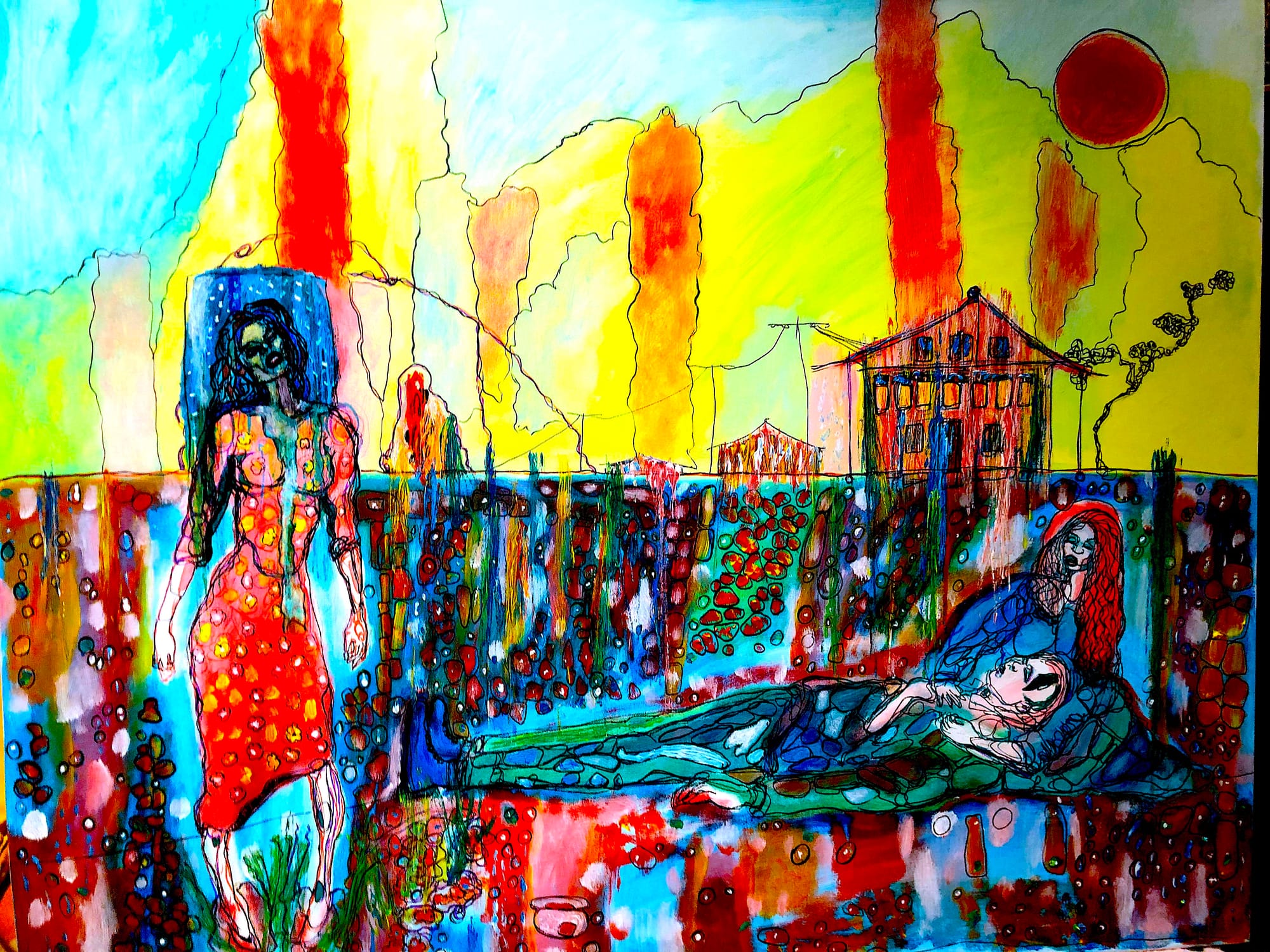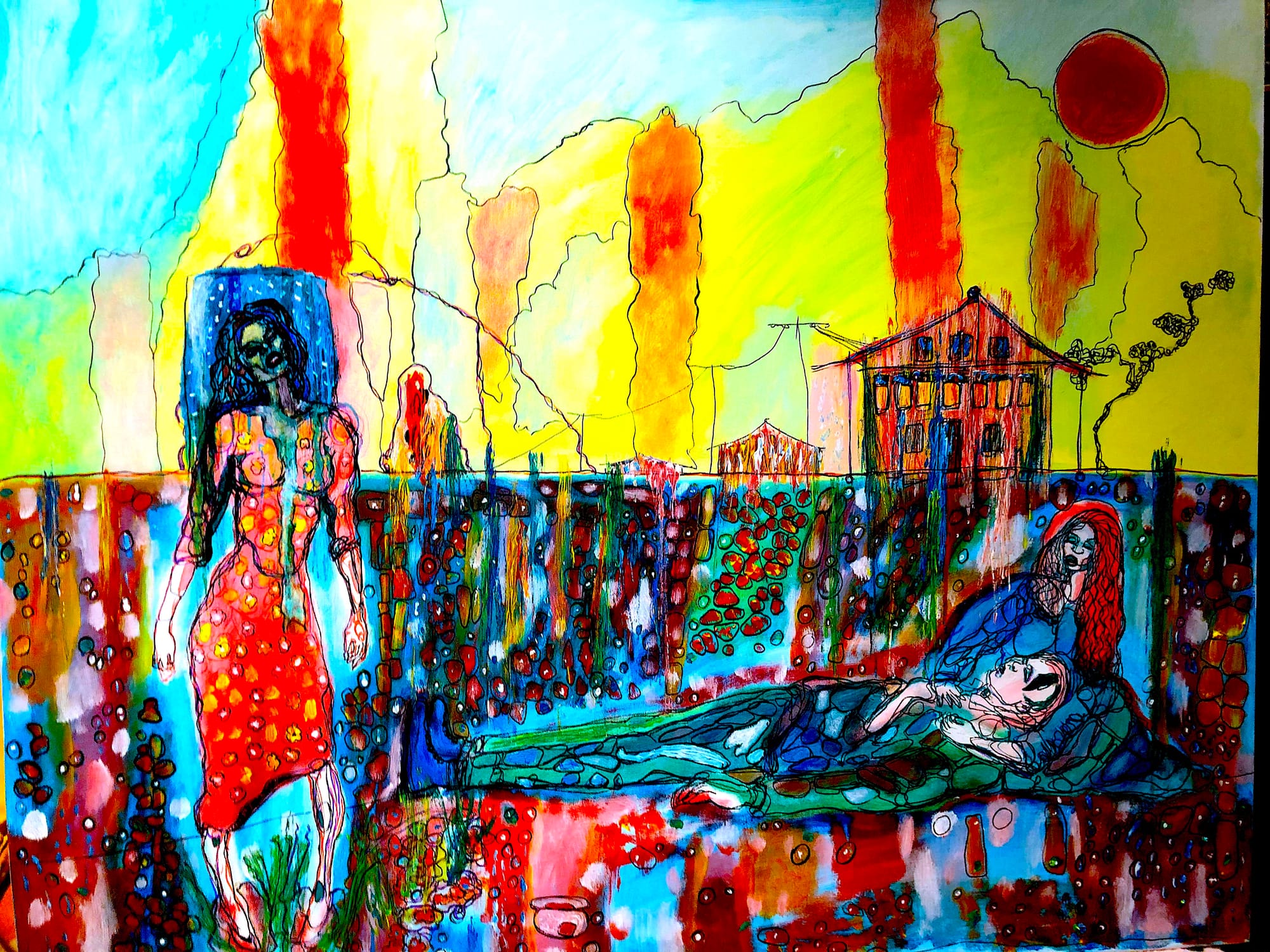The Anesthetists' Reception 2


Chapter 2 Whereby everyone moves slowly, yet the frustration is mute, buried, impossible to vent and thus constantly growing
‘It’s probably gall stones,’ said this doc and it seemed as if what he was doing was milking himself because of circumstances.
Well, our guy, still panting with the pain and trying hard to conceal his ignorance about gall stones generally and these in particular, was wondering whether they were symbolic and important or ludicrous and nothing at all.
He thought this over, thinking possibility is one of those things that despite everything can still disappoint. He wanted to ask the young medic straight out, but instead said:
‘Are you just getting possibility? Is that it? Getting possibility? Getting possibility?’
And the doctor replied evenly: ‘No.’
Nevertheless he felt hardly able to breathe and the thought of possibility trapped in probability’s cage withered away in entropy of sorts, something that was always happening with him.
Alternatives can always be made to look incompatible by all sorts of means, perhaps by conferring an extreme interpretation on each option, he mused, but yet the shooting pains remained and the doctor maintained ‘gall stones’ as being the most likely candidates.
He seemed a trifle offhand about it.
‘You seem a trifle offhand about it,’ grumbled our protagonist.
The young medic shuffled a file and clicked his computer and seemed cheerful.
‘ You have a diagnosis. Though your condition is no doubt a little uncomfortable, it is benign. We shouldn’t debate the thing. That kind of thing is always futile,’ he replied, and his voice was warm and kind and his smile more than a mere description and instead more or less a complete explanation.
Of course this was infuriating to our protagonist because he felt at once ludicrous to be feeling so wretched and agonized by anything the medical fraternity were happy enough to call benign, and also, for connected reasons, a little insulted. Yet who was it being insulting – the doctor or his own ridiculous body – he couldn’t tell, which was another source of confusion that made his feelings simmer beneath his sweats and shakings. He began to say something more but fell back, silent and grim.
But even though now he had an appointment with a hospital to deal with the stones he didn’t feel calmer and the pain was still voluptuous and making him cringe. It made him wonder about everything he’d thought about before, because what he wanted most of all was for the pain to stop and everything to be soaring and beautiful and lovely.
And this made him feel a bit aghast and embarrassed – on top of being insulted and ludicrous - because that wasn’t really the zeitgeisty thing. This zeitgeisty thing was something that always held him in its grip. What was this zeitgeisty thing telling him?
Well, for starters, he knew that he had to be always on the lookout for the master narrative. Which was always bad and insidious and couldn’t be trusted to stay still and could be anywhere and anyone might have it going on even if they didn’t know, because of its disguises and its cunning, devious ways. It had special words that were toxic words that could literally kill a reputation and a situation if they ever came out, and the trouble with them was that the words weren’t always the same as they seemed at first, and were constantly changing, so from minute to minute you could be using a word that wasn’t bad and then in an instant it was, and if you weren’t careful you’d have it there in your mouth and you couldn’t deny it because there it would be.
It was always too late to issue a denial because people would be looking askance, staring over their mugs or glasses or whatever. They would literally come to a standstill upon hearing the word, even if it came out of the blue. Perhaps especially so if it came out of the blue. What could you do if ever you committed such a terrible faux pas? You always had to apologise and be abject or else hope no one caught it. So in the zeitgeist everyone had to be on red alert and ensure that anything like that hadn’t sneaked in through a master narrative back door, so to speak. Because although a front door kind of thing, the master narrative was sneaky and sly and had many cards up its sleeve as well.
And a sign you were on red alert was that you had to be full of violent strangeness and be suitably restless about everything, so that you weren’t caught out being too comfortable and too relaxed when there was so much to be done. So of course anything lovely and calm and happy were suspects and carried the taint of the master narrative lurking about inside them. And when you saw too much loveliness and comfort and self satisfaction it was always wise and the done thing in the zeitgeist to remember that there is too much war and child porn and racism to ever feel delight and comfort and calm for too long, if at all.
On the other hand, he noted bitterly as he reflected on all this through clenched teeth, the pain intense and churning him up so every thought was like a tainted, poisonous withdrawal, he had to remember the separate and nearly divine injunction to be kind. Because kindness didn’t harm people, and there was so much harm in the master narrative that you had to warn people about it more or less everywhere and at all times.
His eyes bulged with pain as he recalled the numerous times he’d debunked the imperialist claims of master narrative proclaimers by exhorting them to think of the terrible harms their words were inflicting on their hearers, and of course, themselves too, unwittingly. And how satisfied he’d felt at this, no matter the incredulity on the faces of those accused of harmful ways, who always until then had thought themselves innocent of causing harm. And how it filled him on such occasions with a sense of brimming goodness and rightness that almost took away his own breath as is often the case when you legislate for the assigning of a separate jurisdiction.
Although immediately he knew that all this behaviour was just a matter of conforming to the zeitgeist rather than anything else, but he couldn’t help that, he thought to himself, almost accusingly. Conformity, it had to be admitted, had never seemed comfortable to his way of thinking.
So he felt very conflicted in a low level way because although the zeitgeist was strong he had found ways of having days off from it or could twist his feelings so they fitted in but from this new, twisty and , to be honest, dishonest angle.
But all the time, of course, there were the harrowing thoughts of zeitgeisty things in the back of his mind that were always churning away, ticking like bombs that one day would undoubtedly blow him up.
And that’ll be right; he supposes he should suffer and he should feel guilt, because how dare he forget about the starving donkeys and the rapists in the board rooms of capitalism and the greasy politicians stealing the orphans and refusing the immigrants, he thought to himself, as pain continued to tear at him from the inside.
Because despite all his ethical thoughts, the pain seemed more pressing and important than the harms of the zeitgeist even though he knew in reality it couldn’t be. And this made the pain seem impertinent, and he felt marooned by this, and in despair.
And then with the pain came an ordinarily meditative and calm, sublimely passive thought. Like, being that way – ordinary, meditative, calm and so forth, they seemed better to him than the normal way he’d had before the pain which was, he rather concluded, and with a slither of guilt, masculine and peering mercilessly all the time.
And less tiring too, he reflected, because always being on guard for the master narrative gives you headaches and a bad back through all that contorting and looking over your shoulders for it lurking over there, and also the stretching.
When he thought about it, all his jogging, gym work, yoga and meditation seemed of ambiguous worth. On the one hand it seemed to go with analysing your inner self to make sure it was hygienic and clear of master narrative stuff. On the other hand it was like a sedative to calm himself down and feel lovely and just accept the way he was without traumas coming through all the time. When he was being analytically hard and grimly critiquey, traumas were always appearing.
This tended to confirm in his own mind the thought that this was better than sedative-induced acceptance because it confirmed the grimness of the real. And when he talked to his friends they didn’t seem to be quite sure which side of this divide they were on or even if there was actually a divide for them. So maybe they thought they were doing both - being fierecly critical and totally self-accepting that is - and they didn't think there was a problem with that, as if each side could be taken so far as to overlap fully or a lot with the other.
He reflected on the fact that undoubtedly they seemed able to cope with being both the wild paranoid modern zeigeisty type hunting down all the bad thoughts and practices all the time whilst also doing things in the more relaxed and tasteful way which was content with languid cosmic beauty in a garden or happy park or palates class.
So there was always a little confusion in him as he went around, because he was inclined to growl when looking at the master narrative and sigh with the cosmos too, and this diversity of approaches was in itself a source of further unease.
He sometimes belittled his meditational ways, seeing himself as getting flustered by repugnant conclusions the zeitgeist revealed, and concluding that the whole tuning in thing was just a matter of performance error, a regression to more welcome conclusions the zeitgeist could only hold in contempt.
Yet he also chastised himself for his more composed, analytic and aggressively critiquing approach. He often caught himself and his compatriots taking their analysis in a way that spoiled the aim of the analysis and investigation and concluded darkly that if this was compliance it was a form of subversive compliance, and corroded the very objectives of the project from its inside.
Such messy thoughts injected a further belligerence and screwed up mood to that which already brought him low, and added to a general misery the physical pain was now compounding.
And he had a poetic thought when he tried to summarise this when he thought ‘the fields between the house and sea are laid out and are ancient and touch volcanoes.’
Which explained why he usually slept alone.
If you like this you might try these other 3:16 novels: